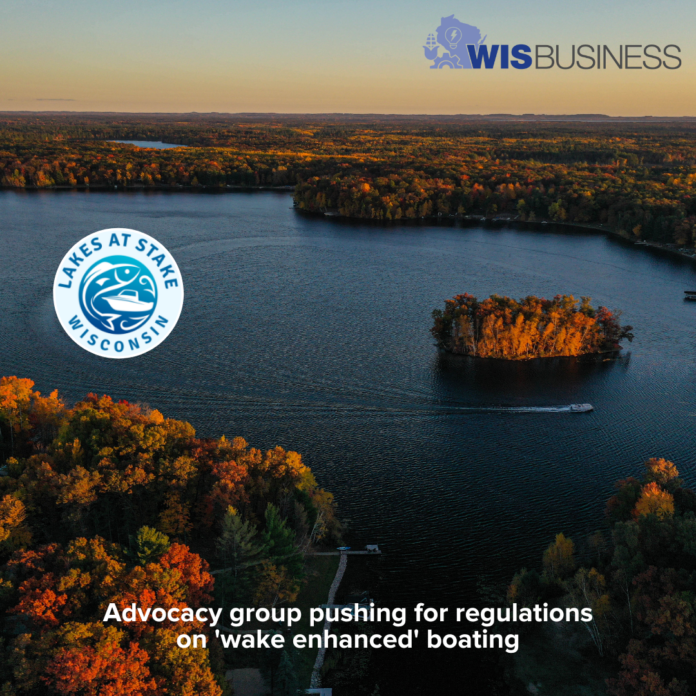An advocacy group called Lakes at Stake Wisconsin wants to ban “wake enhanced” boating on most lakes in the state, arguing the large waves it creates are harming lakefront property values and tourism.
The group’s president, Paul Gardetto, is a 29-year veteran of the U.S. Air Force who owns lakefront property in Waukesha County. In an interview Friday, he discussed the effort to bar enhanced wake sports on Wisconsin lakes smaller than 1,500 acres. That would apply to all but 77 of the state’s more than 15,000 lakes, according to Gardetto.
“We believe that this is a statewide issue … Our approach is to lobby our legislators, and establish appropriate restrictions that allow people to enjoy their sport responsibly,” he told WisBusiness.com.
He stressed that the bipartisan group — made up of property owners, conservationists, anglers and others — doesn’t want to ban the use of these boats altogether. He acknowledged many boaters have invested a lot of money in their watercraft and wouldn’t like being told they can’t use them anymore.
“It’s when they operate in a mode necessary to create a wave similar to a surf wave on the ocean in Hawaii, that they create these big waves,” he said.
This mode of operation involves having a specially molded hull designed to displace large amounts of water, filling a “water bladder” that adds extra weight to push the back of the boat down into the water, and employing a hydrofoil device that shapes the large wake behind the craft.
“The boats aren’t necessarily big, you know, they’re in the 25-foot range,” he explained. “But they’re just heavy, and they plow in order to create this big wave. So it’s that operation, it’s not the boat itself.”
Along with churning up rotting vegetation on the lake bottom, enhanced wake boating also harms fish habitats and disrupts swimming, canoeing and fishing, Gardetto argued. The large waves push lake muck onto the shoreline, causing a bad smell and bringing down the value of lakefront property, he said.
He noted lakefront value is heavily influenced by lake clarity and the quality of the shoreline.
“Renters want a nice cabin on a lake with a natural shoreline, but in order to mitigate the shoreline erosion, owners are having to armor their shoreline … because of the wake boats,” he said. “This wake enhanced operation has an impact on property values and revenue streams.”
He compared these boats with monster trucks, adding they “have a right to enjoy their sport, but they can’t just come plowing through my picnic area.”
The group has hired Steve Lyons, president of SJL Government Affairs and Communications in Madison, as a lobbyist. It’s funded through donations by stakeholders from across the state, according to Gardetto.
“It’s amazing, in the month or so we’ve existed and the couple weeks we’ve been public, the people calling and emailing and writing checks,” he said. “Nothing that says ‘I’m on board’ more than writing a check. And we’re getting a surprising turnout.”
While Lakes at Stake Wisconsin lobbies the Capitol, another legislative effort led by Republicans in the state is approaching the issue from a different angle.
Last month, Rep. Rob Swearingen of Rhinelander and Sen. Mary Felzkowski of Irma circulated a bill for cosponsorship that would prohibit wake sports on bodies of water smaller than 50 acres, and would restrict wake sports activities within 200 feet of a shoreline or water-based structure, according to the memo.
They highlight a “significant surge” in the popularity of water sports like wakesurfing and wakeboarding in recent years.
“While these activities add to our state’s vibrant recreational tapestry, there are pressing safety and conservation concerns that we must address,” they wrote in the memo. “Evidenced by public input, there is a unanimous understanding that while we embrace these sports, regulations are necessary to create a statewide standard that is amenable for those using and patrolling our waterways.”
But Gardetto argues their bill represents the exact position of the wake boating industry, which maintains these craft have minimal impact as long as they’re operated at least 200 feet from shore, and in at least 10 feet of water.
“Our effort is to regulate the sport, but that bill doesn’t go nearly far enough,” he said Friday. “It doesn’t do anything. You already can’t have a wake on a lake smaller than 50 acres. So it does nothing.”
Still, he said his group isn’t in “kill-the-bill mode,” and called the legislation a “good start” despite disagreeing with its specifics.
“I want to commend the effort of Senator Felzkowski and Representative Swearingen for taking a leadership position on it, however it’s just not nearly enough to protect our lakes … We want to get something done,” he said. “We’re going to work with anybody that has the same goal.”
See the website for Lakes at Stake Wisconsin here: https://www.lakesatstake.org/who-we-are
See more on the effort: https://www.wisbusiness.com/wp-content/uploads/2023/11/Lakes-at-Stake-Wisconsin-Press-Release.pdf
See the bill text from Felzkowski and Swearingen: https://www.wisbusiness.com/wp-content/uploads/2023/11/23-3518_1-2.pdf
–By Alex Moe






